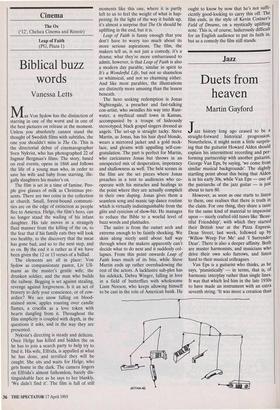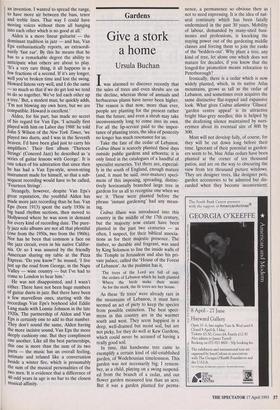Jazz
Duets from heaven
Martin Gayford
Jazz history long ago ceased to be a straight-forward historical progression. Nonetheless, it might seem a little surpris- ing that the guitarist Howard Alden should explain his intermittent recording and per- forming partnership with another guitarist, George Van Eps, by saying, `we come from similar musical backgrounds'. The slightly startling point about this being that Alden is in his early 30s, while Van Eps — one of the patriarchs of the jazz guitar — is just about to turn 80.
However, as soon as one starts to listen to them, one realises that there is truth in the claim. For one thing, they share a taste for the same kind of material to improvise upon — nicely crafted old tunes like 'Beau- tiful Friendship', with which they started their British tour at the Pizza Express, Dean Street, last week, followed up by `Willow Weep For Me' and 'I Surrender Dear'. There is also a deeper affinity. Both are master harmonists, and musicians who drive their own solo furrows, and listen hard to their musical colleagues.
Van Eps is a guitarist who thinks, as he says, `pianistically' — in terms, that is, of harmonic interplay rather than single lines. It was that which led him in the late 1930s to have made an instrument with an extra seventh string. 'It was more a creation than an invention. I wanted to spread the range, to have more air between the bass, tenor and treble lines. That way I could have moving voices without them all banging into each other which is no good at all.'
Alden is a more linear guitarist — the dominant tradition in jazz — and has, Van Eps enthusiastically reports, an extraordi- narily 'fast ear'. By this he means that he has to a remarkable degree the ability to anticipate what others are about to play. `It's a very rare thing, it all happens in a few fractions of a second. If it's any longer, well you've broken time and lost the swing. Howard listens very well, and I do the same — so much so that if we do get lost we tend to do so together. We've led each other up a tree.' But, a modest man, he quickly adds, 'I'm not blowing my own horn, but we are Compatible. Howard is excellent.'
Alden, for his part, has made no secret of his regard for Van Eps. 'I actually first played with him on Labor day 1988' he told John S Wilson of the New York Times, 'we Played two duets, and I was in the Seventh heaven. I'd have been glad just to carry his amplifiers.' Their first album 'Thirteen Strings' (Concord Jazz) he described as 'a series of guitar lessons with George'. It is one token of his admiration that since then he has had a Van Eps-style, seven-string Instrument made for himself, so that a sub- sequent recording would have to be called, `Fourteen Strings'.
Strangely, however, despite Van Eps's great reputation, the youthful Alden has made more jazz recording than he has. Van Eps (born 1913) spent the early 1930s in big band rhythm sections, then moved to Hollywood where he was soon in demand for every kind of recording date. The pure- ly jazz solo albums are not all that plentiful (one from the 1950s, two from the 1960s). Nor has he been that common a face on the jazz circuit, even in his native Califor- nia. Or so I was assured by the friendly American sharing my table at the Pizza Express. 'Do you know?' he mused, 'I live Just up the road from George, in the Napa Valley — wine country — but I've had to Come to London to hear him.'
He was not disappointed, and I wasn't either. There have not been huge numbers of guitar duets in jazz. But there have been a few marvellous ones, starting with the recordings Van Eps's boyhood idol Eddie Lang made with Lonnie Johnson in the late 1920s. The partnership of Alden and Van Eps is certainly one to add to that number. They don't sound the same, Alden having the more incisive sound, Van Eps the more deeply cushiony one. But they compliment one another. Like all the best partnerships, this one is more than the sum of its two parts — the music has an overall feeling, Intimate and relaxed like a conversation beside a winter fire, which is presumably the sum of the musical personalities of the two men. It is evidence that a difference of 40 odd years in age is no bar to the closest musical affinity.



















































 Previous page
Previous page